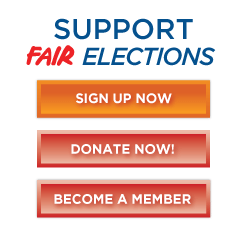SACRAMENTO -- Democratic legislators are making it known
that they won't soon forget the mystery $11 million
donation laundered through three out-of-state political
groups into California ballot battles last month.
Two bills introduced Thursday would put sunshine on
political groups that pour big money into state campaigns.
One, AB 45, would give the state's political watchdog
agency explicit authority to force anonymous outside groups
to reveal their donors. The other, SB 52, would require the
top funders behind political advertisements to list
themselves in the ads.
And now that they have a super majority in both chambers of
the Legislature, Democrats will stand a better chance of
revising the Political Reform Act, which requires a
two-thirds vote. Last year, they were stymied in several
attempts at campaign finance reform.
"We all know that where money comes from and who it's given
to is a relevant factor in making a judgment about the
merits of a particular issue or particular candidate," said
Assemblyman Roger Dickinson, D-Sacramento, who wrote AB
45.
The U.S. Supreme Court's 2010 Citizens United decision,
which erased limits on political spending for corporations
and unions, "essentially legalized money laundering" and
limited the public's ability to know where the money is
coming from, Dickinson said.
A month before November's elections, an Arizona group
funneled $11 million to the California-based Small Business
Action Committee, which was running campaigns against
Proposition 30, Gov. Jerry Brown's tax-hike measure, and
for Proposition 32, the measure that would have curbed
labor's collection of political action dues from
members.
Ann Ravel, the chairwoman of the Fair Political Practices
Commission, fought to find the donors behind the mystery
money, and an 11th-hour ruling by the state Supreme Court
revealed two nonprofit groups with ties to Republican
strategist Karl Rove and the billionaire oil tycoon
brothers, David and Charles Koch.
Ravel said her agency is continuing to investigate who were
the actual individual donors to the two groups, Americans
for Job Security and Center to Protect Patient Rights. In a
similar case, election watchdog groups in Washington, D.C.,
are urging the U.S. Justice Department and Federal Election
Commission to investigate more than $12 million that passed
through two unknown companies in Tennessee to a tea party
group, which spent the money on congressional races.
SB 52, the DISCLOSE Act, would require that the top three
contributors to political ads identify themselves on the
ads and on the campaign's website. Sens. Mark Leno, D-San
Francisco, and Jerry Hill, D-San Mateo, are its
co-authors.
"The only way to stop this covert financing of campaigns is
to require the simple and clear disclosure of the top three
funders of political ads so voters can make well-informed
decisions at the ballot box," Leno said.
A similar bill died in the Senate last year.
"After seeing billions of dollars flow into elections
across our country after the Citizens United decision, we
need the DISCLOSE act now more than ever," Hill said.
DISCLOSE is the acronym for Democracy Is Strengthened by
Casting Light on Spending in Elections.
Contact Steven Harmon at 916-441-2101. Follow him at
Twitter.com/ssharmon. Read the Political Blotter at
IBAbuzz.com/politics.




